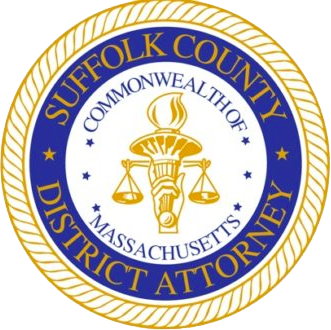Conviction Affirmed for Identical Twin Convicted of Kidnappings, Rapes
Massachusetts Appeals Court Upholds Conviction
BOSTON, November 10, 2020 — The Massachusetts Appeals Court last week upheld the conviction of a man who kidnapped and raped two women in 2004, District Attorney Rachael Rollins said.
DWAYNE MCNAIR, 39, was convicted of eight counts of aggravated rape and two counts of armed robbery at the conclusion of a 2018 jury trial in Suffolk Superior Court. The convictions, which were secured before District Attorney Rollins took office, were upheld in a decision by an Appeals Court panel that found McNair’s right to a speedy trial was not violated when Suffolk prosecutors pursued cutting edge scientific testing to differentiate the defendant’s DNA from that of his identical twin.
At trial, Suffolk prosecutors introduced evidence and testimony to prove that McNair and a second man, ANWAR THOMAS, 38, abducted and sexually assaulted two women on separate dates September 2004.
On Sept. 21, 2004, McNair and Thomas kidnapped the first victim at gunpoint in the area of Forest Hills. They beat her with a handgun and drove her to a remote location, where they sexually assaulted and robbed her. McNair and Thomas then released her in the area of Franklin Park, and she was able to flag down a passing vehicle.
Nine days later, on Sept. 29, 2004, the same two assailants abducted the second victim as she walked in the area of Parker and Hillside streets in Roxbury. As they had before, they beat the woman and sexually assaulted her in a wooded area. As she gathered her clothing following the assaults, the victim was able to collect a condom used by one of the men and provided it to Boston Police.
Criminalists at the Boston Police Crime Laboratory conducted DNA testing of the condom and other evidence that matched biological evidence on those items to the genetic profile of Dwayne McNair – as well as that of McNair’s identical twin brother. Testing available at the time could not differentiate between the two, but police and prosecutors secured additional evidence that led to indictments against McNair in 2012. Among that evidence was the testimony of Thomas, who pleaded guilty to the sexual assaults and testified at trial that it was Dwayne McNair who had taken part in the assaults with him.
As the parties prepared for trial, prosecutors learned of new DNA testing, known as second-generation genome mapping, that could distinguish between identical twins. A Superior Court judge denied a motion by prosecutors to delay the trial as testing was underway, and prosecutors made the difficult decision to withdraw charges in order to secure the scientific evidence in 2014. The new evidence ruled out McNair’s twin brother as the assailant.
Prosecutors presented the new DNA evidence to a grand jury, leading them to again return indictments against McNair in September 2014. A Superior Court judge, however, ruled that the new DNA testing was not yet sufficiently accepted in the forensic field, and excluded the evidence at trial. The criminal case progressed for an additional three years before McNair sought to dismiss the case, arguing that prosecutors’ actions three years earlier violated his right to a speedy trial. The Appeals Court, however, found that the five-year pendency of the case was not, in and of itself, a violation of the defendant’s rights, where the delay did not impact McNair’s ability to mount a defense at trial, and prosecutors had acted in good faith.
In its decision, the Court quoted a decision by the Supreme Court, stating, “The right of a speedy trial is necessarily relative. It is consistent with delays and depends upon circumstances. It secures rights to a defendant. It does not preclude the rights of public justice."
“I’m grateful for the Appeals Court’s careful consideration of the issues raised in this appeal. Prosecutors have a great deal of power in the criminal legal system, and it is important that the courts carefully review any claim that this power may have been misused. Here, the Court found that this office, under a previous District Attorney, acted in the interests of justice in seeking to secure new evidence that spoke to the heart of one of the issues at trial. This was persistent and excellent work by a cohesive team of police, victim witness advocates, investigators, prosecutors and administrative staff,” District Attorney Rollins said. “Mr. McNair’s rights were not violated. The women he kidnapped and raped were ones that were violated are the real victims here, not Mr. McNair. My office remains available to these courageous women and to every survivor who has been sexually violated or harmed in Suffolk County.”
Sexual assault can happen to anyone. While the victims of any crime are asked to call 911 in an emergency, survivors of sexual violence can also call their local rape crisis center for free and confidential services and to discuss their options. Support is available for all survivors of sexual violence, regardless of whether they wish to take part in a criminal prosecution. Services by city and town can be found at www.janedoe.org/find_help/search.
In Suffolk County, the Boston Area Rape Crisis Center offers a free and confidential 24-hour hotline at 800-841-8371. The Boston Area Rape Crisis Center provides medical accompaniment and many other free services to victims of rape and sexual assault. Suffolk victim-witness advocates can assist in referrals to BARCC and a wide array of non-profit service providers who can offer additional support and services.
The case was prosecuted at trial by former ADA David Deakin, who served as Chief of DA Rollins’ Family Protection and Sexual Assault Bureau prior to being appointed as a Superior Court judge. ADA Julianne Campbell argued the case on appeal. Anne Kelley-McCarthy is the Victim Witness Advocate assigned to the case. McNair was represented on appeal by Max Bauer.
Suffolk County District Attorney Rachael Rollins’ office serves the communities of Boston, Chelsea, Revere, and Winthrop, Mass. The office handles over 25,000 cases a year. More than 160 attorneys in the office practice in nine district and municipal courts, Suffolk Superior Court, the Massachusetts Appeals Court, the Supreme Judicial Court, and the Boston Juvenile Courts. The office employs some 300 people and offers a wide range of services and programs to serve anyone who comes in contact with the criminal justice system. This office is committed to educating the public about the services we provide, our commitment to crime prevention, and our dedication to keeping the residents of Suffolk County safe.


